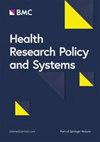Comprehensive HIV knowledge and associated factors among reproductive-age women: analysis of the Gambia Demographic and Health Survey 2019/2020
IF 3.6
2区 医学
Q1 HEALTH POLICY & SERVICES
引用次数: 0
Abstract
Globally, there are 37.7 million people living with human immunodeficiency virus (HIV). So far, there is no study done in Gambia which assessed comprehensive HIV knowledge and its associated factors. Therefore, this study aims to assess comprehensive HIV knowledge and its associated factors among reproductive-age women in Gambia. To assess the prevalence of comprehensive HIV knowledge and its associated factors among reproductive-age women in Gambia. The study used the Gambian Demographic and Health Survey, which was conducted from 21 November 2019 to 30 March 2020 in Gambia. The survey employed a stratified two-stage cluster sampling technique to recruit study participants. Logistic regression analysis was used to identify factors associated with HIV comprehensive knowledge. Statistical significance was declared at a P value of less than 0.05 with a 95% confidence interval (CI). The overall prevalence of comprehensive HIV knowledge was 27.1% (25.1–36.2%). Older age [adjusted odds ratio (AOR) of 1.20 (95% CI 1.16–1.26)], using contraceptive [AOR of 1.15 (95% CI 1.01–1.31)], higher education [AOR of 4.73 (95% CI 3.86–5.81)], rich wealth quintile [AOR of 1.61 (95% CI 1.37–1.87)], media exposure [AOR of 1.76 (95% CI 1.39–2.23)], ever tested for HIV [AOR of 1.55 (95% CI 1.42–1.74)], visited health facility within the last 12 months [AOR of 1.26 (95% CI 1.12–1.41)] and decision-making autonomy [AOR of 1.42 (95% CI 1.27–1.60)] were positively associated with comprehensive HIV knowledge. However, being married [AOR of 0.72 (95% CI 0.62–0.82)] was negatively associated with comprehensive HIV knowledge. The prevalence of comprehensive HIV knowledge was low in Gambia. Educational interventions that focused mainly on awareness creation about HIV/AIDS should be designed especially for married women and lower socio-economic status. An effort has to be made to address those disparities at the national level.育龄妇女对艾滋病毒的全面了解及相关因素:对冈比亚 2019/2020 年人口与健康调查的分析
全球有 3 770 万人类免疫缺陷病毒(HIV)感染者。迄今为止,冈比亚尚未开展过评估艾滋病毒综合知识及其相关因素的研究。因此,本研究旨在评估冈比亚育龄妇女对艾滋病毒的全面认识及其相关因素。评估冈比亚育龄妇女中艾滋病综合知识的普及率及其相关因素。研究使用了冈比亚人口与健康调查,该调查于 2019 年 11 月 21 日至 2020 年 3 月 30 日在冈比亚进行。调查采用了分层两阶段整群抽样技术来招募研究参与者。采用逻辑回归分析来确定与艾滋病毒综合知识相关的因素。当 P 值小于 0.05 且置信区间 (CI) 为 95% 时,即具有统计学意义。艾滋病知识全面性的总体流行率为 27.1%(25.1-36.2%)。年龄较大[调整后的几率比(AOR)为 1.20 (95% CI 1.16-1.26)]、使用避孕药具[AOR 为 1.15 (95% CI 1.01-1.31)]、受教育程度较高[AOR 为 4.73 (95% CI 3.86-5.81)]、富裕的五分位数[AOR 为 1.61 (95% CI 1.37-1.87)]、媒体接触[AOR 为 1.76 (95% CI 1.39-2.23)]、曾经接受过 HIV 检测[AOR 为 1.55(95% CI 为 1.42-1.74)]、在过去 12 个月内去过医疗机构[AOR 为 1.26(95% CI 为 1.12-1.41)]和自主决策[AOR 为 1.42(95% CI 为 1.27-1.60)]与 HIV 知识的全面性呈正相关。然而,已婚[AOR 为 0.72 (95% CI 0.62-0.82)]与艾滋病知识的全面性呈负相关。在冈比亚,艾滋病知识的全面性很低。应特别为已婚妇女和社会经济地位较低的妇女设计主要侧重于提高对艾滋病毒/艾滋病认识的教育干预措施。必须努力在国家一级解决这些差异。
本文章由计算机程序翻译,如有差异,请以英文原文为准。
求助全文
约1分钟内获得全文
求助全文
来源期刊

Health Research Policy and Systems
HEALTH POLICY & SERVICES-
CiteScore
7.50
自引率
7.50%
发文量
124
审稿时长
27 weeks
期刊介绍:
Health Research Policy and Systems is an Open Access, peer-reviewed, online journal that aims to provide a platform for the global research community to share their views, findings, insights and successes. Health Research Policy and Systems considers manuscripts that investigate the role of evidence-based health policy and health research systems in ensuring the efficient utilization and application of knowledge to improve health and health equity, especially in developing countries. Research is the foundation for improvements in public health. The problem is that people involved in different areas of research, together with managers and administrators in charge of research entities, do not communicate sufficiently with each other.
 求助内容:
求助内容: 应助结果提醒方式:
应助结果提醒方式:


